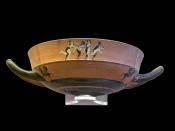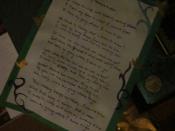Tone is defined by The American Heritage Dictionary as a manner of expression in speech or writing. Our literature book expands on this definition by saying tone is not an attitude, but it is whenever the poem makes an attitude clear to us. One poet to whom tone is very important is Theodore Roethke, author of "I Knew a Woman."� Roethke's writings range from clever poems in strict meter and regular stanzas to free verse poems full of imagery. Also, he is known for his use of environmental images in his works. In "I Knew a Woman,"� Roethke's tone is of a sexual sense. To fully examine Roethke's tone, we must examine his word choice, his use of connotations, and his meter and rhyme scheme.
In Roethke's poem, "I Knew a Woman,"� he chooses his words very carefully to convey the tone he wants to his audience. At first glance, this poem seems totally innocent, but after a deeper look the true meaning of the poem becomes apparent.
The reason the poem at first may seem totally innocent is because many of the words and phrases can have more than one meaning. An example of the use of a phrase with a double meaning is when the poet says he comes "behind her for her pretty sake."� This phrase can be taken one of two ways. You can take it literally or you can take it in a sexual sense. Literally, this phrase would mean that the protagonist walked behind the beautiful woman. However, if you view this phrase in a sexual sense it means that the protagonist waited to reach climax until the woman was satisfied. This use of words and phrases having more than one meaning is a strong contributor to Roethke's tone.
A second important contributing factor to Roethke's tone is his use of connotations. Lines that the audience would normally pass over contain hidden sexual meaning, revealed after a closer look. Throughout the poem Roethke uses several connotations regarding sex. In line fourteen the poet says, ""æwhat prodigious mowing we did make."� After a little research, the reader will find that "to mow,"� in Scottish dialect, means to have sexual intercourse. The use of connotations in Roethke's work contributes a great deal to the overall tone of the poem.
The final example that contributes to Roethke's tone in "I Knew a Woman"� is his meter and rhyme scheme. This may seem like a minor contributor, but in actuality it is a huge contributor to the overall tone. The poem contains many caesural pauses, so that the voice is stopping and the audience is anxiously awaiting the satisfaction of the completed phrase. This is very effective contributor to the tone. Another example that contributes to the tone of the poem is how each half line is balanced against its compliment "" "sighed,"� "sigh"�; "moved,"� moved"�; "container,"� "contain."� (779). These are just a few of the many examples of how Roethke balances his lines with a compliment. Even though meter and rhyme scheme, to some, may seem only a minor contributor to the overall tone of a poem, in actuality it contributes much.
Tone is very important in poetry. In fact, two poems with basically the same words but with a different tone can have two separate meanings. In Roethke's, "I Knew a Woman,"� we see how he develops his tone by studying his word choice, his use of connotations, and lastly, his meter and rhyme scheme. After examining subtle details of Roethke's tone development we see that he intends for this poem to be sexually suggestive.
Works Cited Roethke, Theodore. "I Knew a Woman."� Literature, An Introduction to Fiction, Poetry, and Drama. Ed. X. J. Kennedy and Dana Giola. Seventh ed. New York: Longman, 1999.






